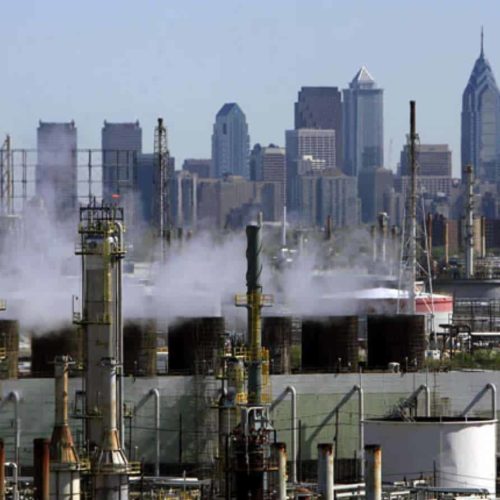Introduction
A Pennsylvania lawmaker will convene a hearing Thursday on risks posed by toxic releases from oil refineries, notably hydrofluoric acid, a deadly compound featured in a joint investigation by the Center for Public Integrity and ABC News in February. The hearing underscores concern in some communities about use of the acid, which could spread quickly into neighborhoods in the event of a release.
Citing the investigation, state Rep. Maria Donatucci, a Democrat from Philadelphia, said in a news release that she has been “pressing for verifiable assurances from refinery operators and emergency preparedness officials that they have safety procedures in place to respond to toxic chemical leaks and to promptly alert the public.”
Fifty refineries in the United States use hydrofluoric acid – also known as HF – as a catalyst to make high-octane gasoline, although a safer alternative exists. One of these refineries, operated by Sunoco, is located just south of downtown Philadelphia, near the city’s professional sports complex. An HF release from the plant in March 2009 sent 13 contract workers to the hospital. One of those workers has sued Sunoco, claiming he continues to suffer serious ailments as a result of the accident.
The refinery has had two fires since the beginning of the year, neither involving an HF release. Its general manager is among those scheduled to testify Thursday; also scheduled are two representatives of the United Steelworkers union, which represents a number of Sunoco workers, and the director of the Philadelphia Project on Occupational Safety and Health.
A Sunoco spokesman did not respond to a request for comment this morning but has said previously that the company has put safety measures in place to keep the acid from escaping. It recently spent $125 million to convert to a modified form of HF, which reduces – but does not eliminate – risks to workers and the public.
In her news release, Rep. Donatucci said she was worried about HF and other hazardous compounds used at Sunoco even before the Center-ABC investigation. In January 2010, she said, the leak of a “relatively harmless cleaning agent” from the refinery created “near panic” because of poor communication between the company and first responders.
“Thousands of people were in fear for their lives when a strong odor spread across numerous neighborhoods,” Donatucci said. “Hundreds of calls to emergency dispatchers and the news media provided no answer. I consider the 2010 incident a warning. What if it had been a toxic spill? Would the emergency notification system work any better or would first responders again be left in the dark?”
Donatucci said she is “especially concerned about a leak of hydrofluoric acid.” The acid is known for its ability to cover long distances quickly in a cloud.


Join the conversation
Show Comments